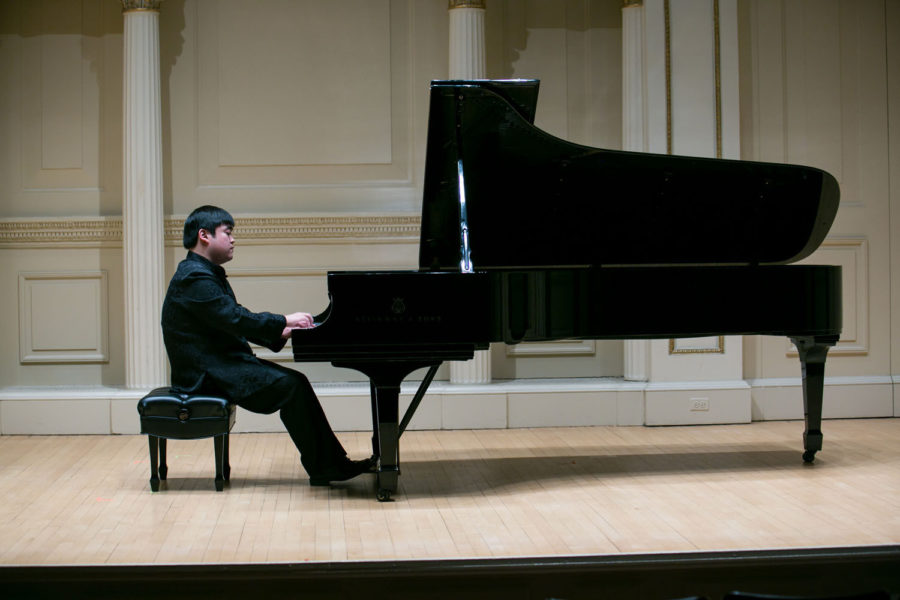University doctoral student performs at famed Carnegie Hall
The Cincinnati World Piano Competition presented Moye Chen, 2014 Gold Medalist in Weill Hall at Carnegie Hall.
Feb 10, 2015
On Monday, Moye Chen sat in the dim lobby of the Krannert Center for the Performing Arts. He appeared to be a typical 31-year-old doctoral student, wearing a black hoodie and a black backpack, as jazz music played in the background. But just a month ago, on Jan. 19, he sat on stage in front of the sold-out Weill Recital Hall of New York City’s Carnegie Hall. In front of over 250 audience members, he played piano as a part of the grand prize for winning the 2014 gold medal in the Cincinnati World Piano Competition.
Since winning the annual competition in June, Chen prepared for over six months for his “debut recital” in New York. Yet Chen — currently a University doctoral student after graduating with a bachelor’s and master’s from Shanghai Conservatory of Music — isn’t new to performing in front of noteworthy audiences. Across the U.S. and China, his home country. Chen has performed and won numerous national and world competitions over the last decade.
The Daily Illini sat down with Chen to learn about his experience at Carnegie and his work as a competitive pianist.
Daily Illini: How did you know you wanted to become a concert pianist?
Moye Chen: I studied the piano at age seven, but from age 13, I began to study the piano seriously. Before that I never thought I could be a concert pianist; maybe in my undergraduate period. … (Now,) I am a doctoral piano student. The full name of this degree is DMA, Doctoral of Musical Arts.
Get The Daily Illini in your inbox!
DI: How did you get the opportunity to perform at Carnegie Hall?
MC: (It depended) on my winning at the Cinncinnati piano competition; it was my first time. This was part of the first prize, a debut at Carnegie Hall.
DI: How did you feel when you won that competition?
MC: It was very exciting of course, and I think this competition provides a very good engagement for the winners, because Carnegie Hall is one of the most important concert halls in the world. I think it is excellent experience for any pianist. For me, I think because there were some famous concert pianists (such as Frederic Chiu and Spencer Myer) that joined my recital and it sold out, it was a very important experience in my life.
(I brought) the executive director Mark Ernster (from the World Piano Competition) and my wife, and I played works by (Domenico) Scarlatti, (Edvard) Grieg/Mozart, (Franz) Liszt, (Alexander) Scriabin and (Sergei) Rachmaninoff. It is hard to say a favorite but for me … (it’s) Rachmaninoff, Scriabin, Beethoven and (César) Franck. Every concert I like to add some Scriabin pieces. In Carnegie Hall, I loved every piece, but maybe Scriabin’s “Valse (in A-flat Major, Op. 38).”
DI: What was the most challenging part of performing at Carnegie?
MC: New York is the center of the music world, so you have to play your best level at Carnegie Hall. You have to convince the audience and try your best to attract them to like your performance. I think this was very challenging for me because you have to try your best to do everything, know every piece. You have to prepare it very well.
DI: What’s in store for your future performances and other plans?
MC: Next month, (I will) perform in the Conservatory of Music at University of Cincinnati. I need to continue my competition career, and also I need to complete my doctorate here.
DI: What is your advice for aspiring pianists?
MC: I have two suggestions; one is especially for young pianists. Try to use your heart and soul to perform and understand the piece. The second is to do some research when you learn a new piece, because research is really helpful to understand the composer’s intention. I encourage students to try Cincinnati’s next World Piano Competition. As a previous winner, I know they provide a very good opportunity for all concert pianists.
Annabeth can be reached at [email protected].






